How We Support Partners
We welcome inquiries about partnerships and ask that interested groups read this page carefully before applying for a partnership. Please email us at DCoffice@advocacynet for more information.
 |
Step 1: Focus on survivorsWe believe that those who have faced discrimination and abuse can be powerful agents of change, but are usually ignored by conventional aid. They are our special focus. We work with seven broad categories: women and girls; children; survivors of conflict; persons with disability; minorities; indigenous people; defenders of the environment. Photo: AP helped Soraya Post, a Sinti leader from Sweden, to launch the International Roma Women’s Network. Soraya was the first Roma woman elected to the European Parliament. |
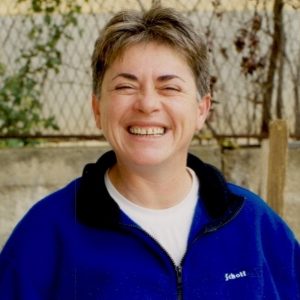 |
Step 2: Partner with community leadersWe manage projects jointly with associations or organizations that represent survivors and their community. Partners that are supported by AP work for social justice and actively seek to empower stakeholders. In the short-term, they seek to move from a voluntary association to organization. They should also have a long-term vision for social change. Partnerships can last for five years or until the program achieves self-sufficiency. Each stage is governed by an MOU. Photo: AP support helped Igo Rogova turn the Kosovo Women’s Network into a powerful advocate for women in Kosovo following the 1999 war and independence. |
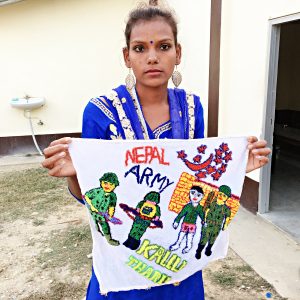 |
Step 3: Tell the storyWe begin a partnership by helping survivors to tell their story. Many use embroidery, which allows women to express themselves, work together, learn a skill, and give structure to their association. We cover the costs (of training, material and stipends). We then help the partner assemble the embroidery into advocacy quilts for use locally and internationally. Photo: Sharmila‘s father Kallu was seized by the security forces in Nepal during the conflict. He has not reappeared. |
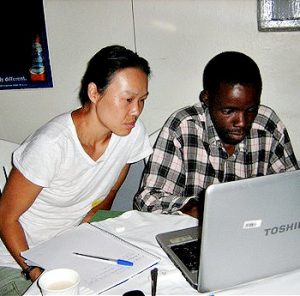 |
Step 4: Peace FellowWe create a support team for each project led by a student Peace Fellow who will work remotely or in person for a minimum of ten weeks. Fellows meet weekly with their host organizations to review progress on the start-up, provide technical support, and help with fundraising. Click here to meet past Fellows. Photo: Dina Buck from Denver University, helped Batwa advocates in Uganda to develop and maintain a website. |
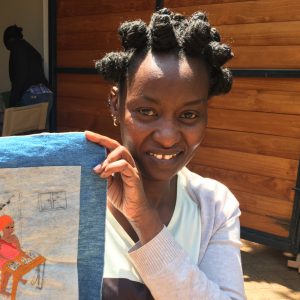 |
Step 5: Six-month start-upAP provides up to $1,000 to help new partners develop an innovative start-up within six months. The goals and budget are included in an MOU agreed by both partners. If the goals are met, we will work with the partner to seek funding for a second phase (Below). Photo: After working with AP on two embroidery projects in Kenya. Stella Makena has launched a start-up to help women use vermiculture and composting to improve nutrition in the Kibera settlement of Nairobi. |
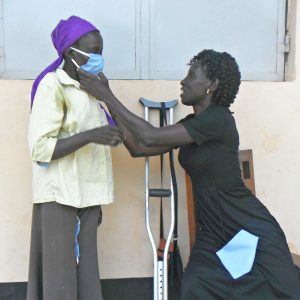 |
Step 6: 18-month projectIf the goals of the start-up are met within six months, we will help the partner develop and implement an 18-month plan and omnibus budget, post a website, and broaden the search for funding. This will include an appeal on GlobalGiving that will reach out to the partner’s northern supporters. Photo: With help from AP and the Gulu Disabled Persons Union (GDPU) Mama Cave launched a start-up to produce face-masks in Uganda during the height of the pandemic. |
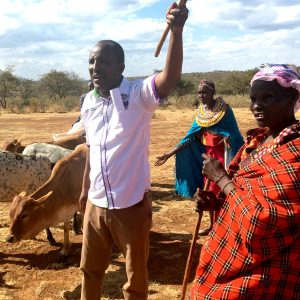 |
Step 7: Five-year campaignIf program goals are met after 18 months, we may help the partner organization to scale up the program in the hope of achieving self-sufficiency by year 5. AP will offer from these services and online trainings and charge 10% of all funds raised. Photo: AP is working with Children Peace Initiative Kenya, founded by Hilary Bukuno, to secure long-term funding for CPIK’s work with pastoralists and create a strong and sustainable organization. |
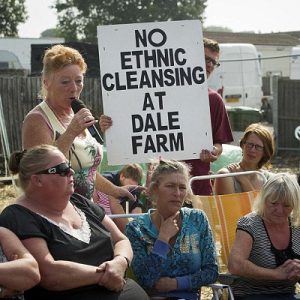 |
Step 8: Online promotionWe offer partners coverage through our online news service, which reaches over 5,500 subscribers; our online photo library; our YouTube channel; and website. Photo: We received abusive coverage in the local media for our 5-year coverage of the efforts of Travelers to escape eviction from the Dale Farm encampment in the county of Essex, UK. The campaign secured a historic win in the High Court, but ended – sadly – in eviction. |
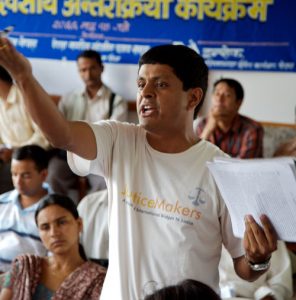 |
Step 9: International advocacyAP promotes the work of partners internationally, at the UN, and with governments. In 2019 we helped the Network of Families of the Disappeared in Nepal (NEFAD) to make the case for reparations at the UN working group on disappearances in Geneva. Photo: Ram Bhandari has welded NEFAD into a formidable advocate for the rights of family members in Nepal. AP has supported Ram through bulletins, video, blogs, photos, podcasts, quilts, reports and with donors. |
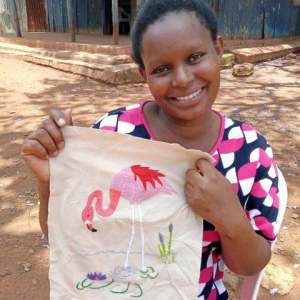 |
Step 10: North-South partnershipsAP’s global network enables us to build innovative partnerships between the Global North and South. One of our most successful projects, Sister Artists, helps fiber artists in Africa and North America to collaborate in making art quilts which are auctioned to help the artists in Africa. We have also helped girls in the US and Zimbabwe to make soap together, and are developing a composting partnership between schools in Kenya and the US. Photo: Agnes Mogire is among 200 women artists in Kenya and North America who have made quilts for Sister Artists. |
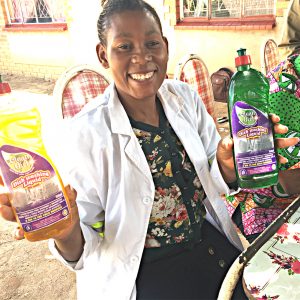 |
Step 11: Strengthening organizationsAP helps survivors turn their associations into organizations that can manage campaigns and attract donors. We expect this to occur naturally in the course of producing budgets, setting goals, managing receipts, making a website and working with a board – all of which will be needed to implement projects successfully. Such “capacity-building” cuts both ways because we learn as much from partners as they do from us. Photo: In 5 years, Constance Mugari has built Women Advocacy Project into a thriving soap business employing girls from poor families in Harare. |
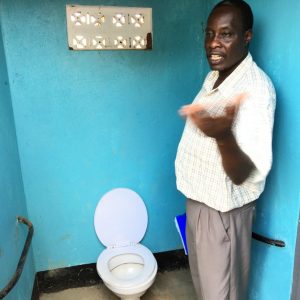 |
Step 12: Sustainability and social changeWe hope that programs we support will eventually change society as a whole, beyond the intended beneficiaries. With this in mind we are ready to work with partners for up to five years or until they achieve self-sufficiency. Such programs can also spin off new start-ups . Photo: Patrick Ojok from the Gulu Disabled Persons Union has installed WASH in 5 primary schools in Gulu district since 2015, with funding through AP. The benefits to hygiene and enrollment are evident and the district government is interested in using the GDPU model of WASH – which involves parents – throughout Gulu District. |
